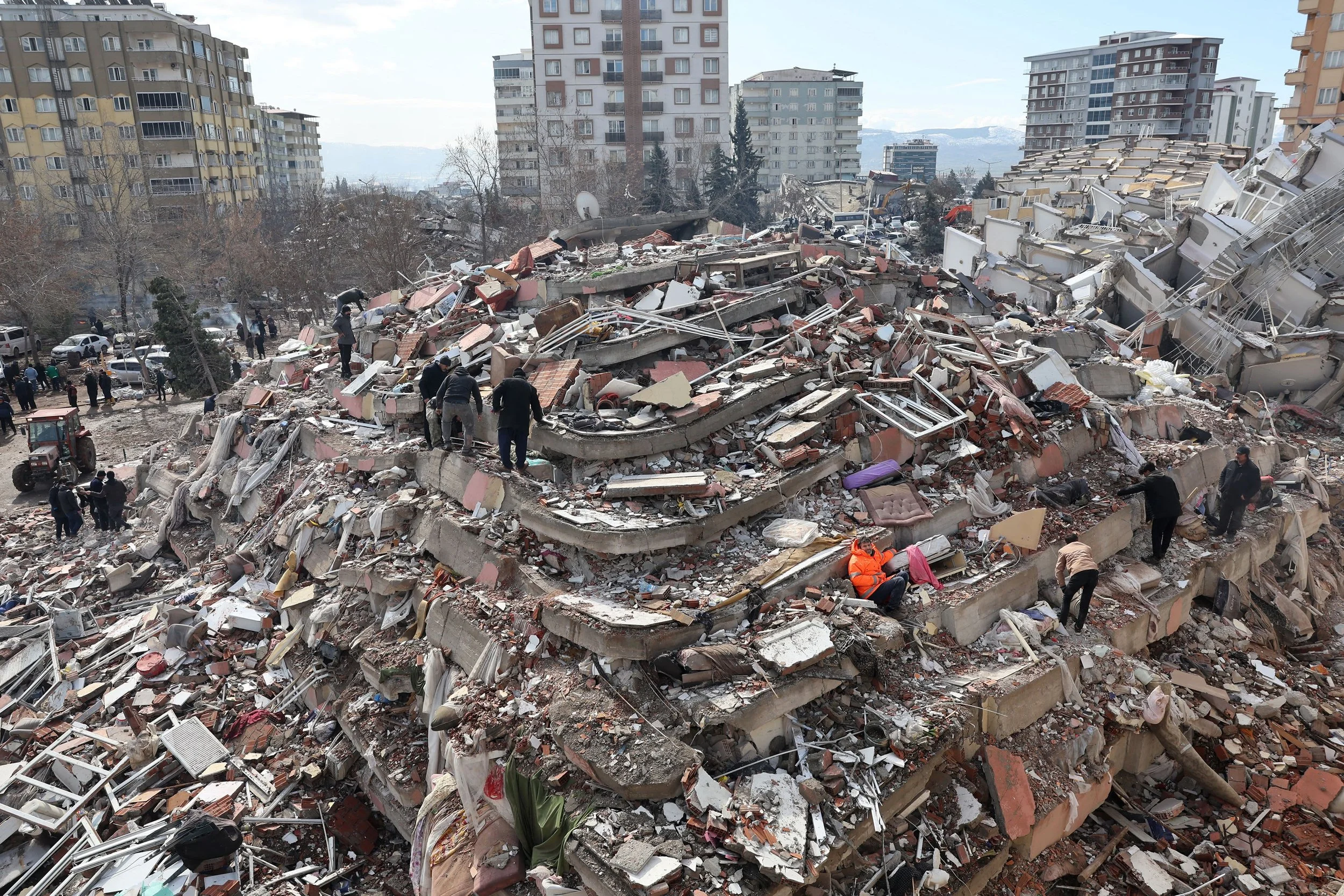Violence and uncertainty have gripped the young Republic of Mozambique in recent months; thousands have been detained and over 100 killed after widespread protests broke out in response to the country’s most recent national elections. Numerous accusations of election fraud and interference have been made after Mozambique’s incumbent party, Frelimo, once again claimed victory.
Read MoreSince the end of World War II, many nations in the Western world have held an aversion to far-right thought, especially in Europe. In no country is this more apparent than Germany. After the war, there was an intense denazification process that took place with the help of Allied nations.
Read MoreFebruary 24, 2022. Devastation and war. The beginning of a several-year assault on the sovereign country of Ukraine. Tensions between Russia and Ukraine date back to the 1960s and 1970s, foreshadowing the legal dissolution of the U.S.S.R.
Read MoreRussia’s invasion of Ukraine in late February of this year sparked solidarity and support for the Ukrainian people across the international community. In the United States, President Biden described the Ukrainian people during the State of the Union address as a fearlessly strong group fighting an illegitimate aggressor. On a state-wide front, California has taken initiative in supporting both Ukraine and Ukrainian migrants directly.
Read MoreAlong the southern coast of Ghana, dozens of young men flock to port cities in hopes of stowing away on departing commercial ships. Two of these men, Jonathan and Michael, are from the port city of Takoradi, whose fishing industry has greatly suffered due to a rapidly changing climate. With severely overfished waters and rising sea levels, Ghana’s coast has become increasingly unfishable, suffering from dangerous tides, perennial storm surges, and dwindling fish populations.
Like other fishermen, Jonathan and Michael decided to emigrate to find new economic opportunities.
Read MoreIn the halls of history, there are few national rivalries more iconic than that of the United States and Russia. Certainly, there are none that have more thoroughly shaped the topography of modern geopolitics.
For nearly fifty years, the U.S. and the Soviet Union spread their dominion over their opposite halves of the globe, staring each other down across the Pacific while the world held its breath. After the fall of the Soviet Union, the U.S. and Russia saw a short period of reluctant coexistence, with Obama-era leaders even sharing hopes of a “reset” in relations between the two countries.
Read MoreOn September 19th, 2023, Azerbaijan launched a swift invasion into the Armenian breakaway Republic of Artsakh, forcing its capitulation the next day. Over one hundred thousand Armenians fled the region in the following days, in what Armenia has claimed to be an effort by the Azerbaijani government to ethnically cleanse the Armenian population in the region. The conflict over the small mountainous region, which had raged for 35 years, ended in just one day.
Read MoreThe rarity of the quadrennial event of the Olympics creates a huge buzz around the world. The best of the best athletes from all corners of the globe compete under bright lights proudly in their nation's colors. It comes with an extreme glitz and glamor for sports taking center stage of media and conversations for these special few weeks. This silencing attention that the games receive, even from those who are not avid sports fans, creates an anomalous ability for athletes to speak to the globe as a whole.
Read MoreSince September 11th, 2001, the United States has initiated an international “War On Terror”, with the stated objectives being targeting and eliminating the networks of terrorism responsible for the events of 9/11. Over the previous two decades, 940,000 individuals have perished directly because of the ongoing wars throughout the greater Middle East. Approximately 3.5-3.8 million individuals have died indirectly because of the humanitarian catastrophes that have unfolded since the wars began. Between 38 and 57 million individuals have been displaced, becoming refugees and creating what are considered to be among the worst humanitarian catastrophes that have ever occurred.
Read MoreOn November 19, 2023, Argentina held a historic general election that will likely redefine its existing center-left to center-right party system. Javier Milei, an economist and deputy in the Argentine Congress won election to the Presidency with 56 percent of the vote. In recent decades, Argentina has reeled from a series of economic crises, including debt defaults, depressions and currency crises; the inflation rate topped 120 percent as of October. These woes have greatly impacted the standard of living of ordinary people, as the depreciation of Argentina’s currency induces unpredictability and effectively erases private savings by forcing up the real cost of goods.
Read MoreThe prevailing paradigm of US national security discourse leaves the impression that the emergence of leftist leaders in the developing world is fundamentally at odds with America’s global ambitions. The right holds this view for obvious reasons. Conservatives vigorously tout unfettered markets and military dominance—all things contrary to the egalitarian world leftists want to create—as inviolable components of American hegemony. But the same message is effectively endorsed by progressives who have, for the most part, given up on levers of foreign policy making in favor of pursuing an exclusively domestic agenda.
Read MoreIn one of the most iconic satirical films of the 21st Century, Tropic Thunder, the aggressively unlikeable studio executive Les Grossman, played by Tom Cruise, finds himself in a shockingly serious and delicate situation. He finds that the actors he sent to a remote South Asian jungle to shoot a film were captured as ransom by the ‘Flaming Dragon’ gang, who demand $100 million in ransom money in order to release their actors. With stark comedic poise, the ill-tempered Grossman tells the gang to ‘skin the bastards alive’ and to not forget to ‘go fuck themselves’. When confronted by devoted agent Rick Peck, played by Matthew McConaughey, with the fact that they will murder the captives, Grossman eloquently responds with the notorious line: “We don’t negotiate with terrorists”, which is followed by an enthused patriotic applause by the crowd.
Read MoreIn India, a Christian family was beaten and harassed by their neighbors and the Hindu nationalist group RSS. Ritesh, his wife Vanya, and their children became Christian in 2016. Despite their cautious and secretive practice of the faith, they could not avoid the omnipresent eyes of their Hindu village. Following intimidation and coercion by a group deployed by the RSS, the family was brought before Hindu leaders. They were interrogated, beaten, and later arrested.
Read MoreFrance is no stranger to laws and acts that can be seen as anti-Islamic by the public. This year has proved no different for French organizations. With a French soccer league ban on stoppage in a professional match during Ramadan, morals for French organizations and the government are once again taken into question.
Read MoreThe mainstream narrative that we are sold by the media about migration into the United States is simple: the poor come to this country to escape the plights of their home countries and follow the American dream to become rich and prosperous. While this idea sounds star-spangled awesome, there is a dark side to why people have moved to the US in the past century. While there are clear and present dangers to people in lower-income countries, such as natural disasters, the main culprit is social immobility. In the United States, there is a vague belief that anyone can be anything: The American Dream.
Read MoreIn recent years, the government of Bharatiya Janata Party (BJP) Prime Minister Narendra Modi has attracted criticism from internal and international actors alike for its majoritarian policies. These include the repeal of Article 370 of the Indian Constitution providing autonomy to the Muslim-majority state of Jammu and Kashmir along with the introduction of the Citizenship Amendment Act (CAA) and the National Register of Citizens (NRC). The CAA expands the provision of citizenship for refugees from Pakistan, Afghanistan, and Bangladesh exclusively to non-Muslim minorities, while the implementation of the NRC in the state of Assam may disproportionately target Muslim citizens through its efforts to identify and deport illegal immigrants. Clearly, at least from the perspective of Western media outlets like the New York Times, the Bharatiya Janata Party has engaged in an assault on the secular principles of the Republic of India.
Read MoreThe morning of February 6th was peaceful. The twilight sky was still dark, but stars were slowly becoming less visible. Residents were waking up little by little to get ready for work and start their day. But at around six o’clock in the morning, the ground shook and everyone who was sleeping in northern Syria and southern Turkey were awoken by an massive earthquake that would record a 7.8 on the Richter Scale. It would be felt in Lebanon, Israel and even parts of Iran. Around 60 aftershocks would occur with the biggest one having a magnitude of 7.5 following the initial quake.
Read MoreLess eggs, less meat, and more chicken feet. While at first glance this may sound like a bizarre nursery rhyme for some, Egyptians know all too well that this is what state-run media in Egypt considers a good alternative to the crippling inflation that has become impossible for anyone in the country to ignore. When speaking to Egyptians today, it is clear that many are starting to lose patience with the consistently ailing economic situation. “We legitimately don’t know where the country is headed.
Read MoreOffices trashed, fire alarms blaring, sprinklers set off, stolen artifacts. Congress had become a battlefield of democracy. But this time, it was not Americans attempting to overthrow the government. It was Brazilians. The familiar story took place on the floor of the House of Deputies, the lower House of Congress in Brasilia, Brazil just a week after the inauguration of the new president. This is not common in the history of industrialized states like the U.S. and Brazil, however these two countries took to similar methods after stark electoral losses.
Read MoreShall we play a game?
No, this is not a 1980s film about Mattew Broderick staving off nuclear disaster, but another age-old game that we have been playing since humanity existed: war. As with the board game with the same name, war involves risks, either taking them or accepting them based on the cards you are dealt. Unlike the board game, however, the fog of war clouds the capabilities of the enemy, and leaders risk either diving headfirst into a body of cool water, or solid concrete.
Read More



















